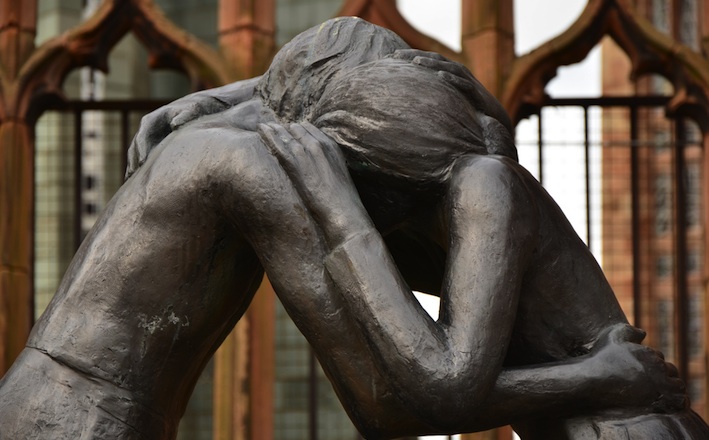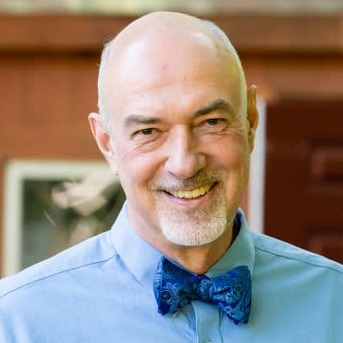Commentary on Matthew 18:15-20
The sayings on binding and loosing in Matthew 18:18 (and 16:19) have presented a puzzle that resists precise resolution.
Jesus tells his disciples that what they bind or loose on earth is also bound or loosed in heaven. This is both a startling grant of authority and a warning to the disciples. With authority comes profound responsibility, especially when the community represents God’s presence and power in the world.
But what does binding and loosing really mean? The scholarly consensus has been that these terms have something to do with determining the boundaries of the community, intervening in conflicts, settling matters of doctrinal dispute, and deciding who is in and who is out. These matters, however, focus more on the consequences of binding and loosing than on the practice itself. Underneath the identification and authorization of leaders, the determination of boundaries, and the settling of doctrines there is always a web of prior assumptions, interests, and power relations, all of which shape and preserve the entitlements and liberties some people have and the weights and burdens that others are compelled to carry. The church is not immune to these dynamics, and Jesus knows it.
In Matthew 18, Jesus does not seem very interested in abstract boundaries or doctrines, or in precise determinations of the lines that determine who is in and who is out. Nor is it likely that Jesus’ words are meant primarily to support the development of an ecclesial hierarchy and affirm the authority of church leaders. Matthew’s Jesus is, rather, concerned about “the least ones,” the vulnerable, the ones at the bottom of the power pyramid. Better to tie a millstone around your neck and jump in the ocean than cause a little one to stumble (Matthew 18:6). Better to leave ninety-nine sheep on the mountains than lose a little one (18:12). The point of Matthew 18 is not that the church or its leaders possess special authority or insight when dealing with disputes, but that whenever it does exercise authority, it must pay ceaseless attention to the least powerful members of the community. Whenever and whatever we bind or loose, the Christian community is called to defend the interests of the least ones in our midst, as well as to create the space and conditions for forgiveness and restoration to flourish.
While “binding and loosing” have come to designate the articulation of power in ecclesial settings, at a deeper level, binding and loosing are practices in which we take part on a daily basis, usually unconsciously. What we bind and loose is integrally related to worldviews, values, and life scripts. Binding and loosing are not just about doctrines, but about where we shop, the neighborhoods where we buy houses, and our decisions to turn some people into friends and others into enemies, some into heroes and others into terrorists. This constant activity sets in place and reifies relationships, which, according to Matthew 18:18, even the powers of heaven may not be able to undo. The issue in Matthew 18 is not whether the community and its leaders have power to bind and loose, but the values, worldviews, convictions, and practices that shape this authority in distinctive ways.
Matthew’s discourse on community discipline, as chapter 18 is often designated, in fact describes the foundational values and practices that distinguish the community of disciples from any other: solidarity with one another as “children” (Matthew 18:1-5), avoidance of actions that cause others to “stumble” (18:6-9), care for the most vulnerable (18:6, 10, 14), restoration of those who go astray (18:12-14, 15-17), and forgiveness without limit (18:21-35). In the pursuit of this vision and these practices, the community embodies and represents the empire of heaven on earth (18:18-19) and Jesus himself is present among them (18:20). The process described in 18:15-17 is a concrete example of a careful, orderly, and, most important, persistent means of dealing with kinds of interpersonal conflicts that lead to “binding and loosing” (18:18-19). The process Jesus describes resembles, and has been a foundation for, modern practices associated with “restorative justice,” which focus less on punishment and more on the restoration of dignity and wholeness for both the conflicted parties and their communities.
What does this kind of binding and loosing look like in our world? Elbert Parr Tuttle was a young lawyer based in Atlanta and a National Guard officer when he was sent to Elberton, Georgia in 1931 to organize efforts to restrain a mob and restore order after a black man had been accused of rape by a white woman. Tuttle succeeded in helping the accused escape the lynch mob that day, but at the subsequent trial, twelve white men produced a guilty verdict after a two hour trial and six minutes of deliberation, on largely contrived evidence, resulting in a death penalty.
Tuttle went on to organize legal resources to appeal the case, but was ultimately frustrated. The man was executed three years later. Tuttle’s experiences with this case changed his view of the world. Tuttle went on to become a highly successful lawyer and was eventually appointed to serve as the chief justice of the Fifth Circuit Federal Court of Appeals, with jurisdiction over southern states from Texas to Florida. Tuttle was on the bench during the years when Civil Rights legislation first began to challenge long-standing patterns of racism. He was responsible for making sure that decisions handed down by the Supreme Court actually became law in practice. Elbert Tuttle, a white man who grew up in Hawaii, bound himself to the cause of a black man wrongly accused and sentenced to die. Although he lost the struggle for that man’s life, he nonetheless bound himself to the ongoing struggle to loose the shackles of racism that still plague our country. Tuttle became, arguably, the chief jurist not only of the Fifth Circuit, but of the Civil Rights revolution of the 1950s and ’60s. This is binding and loosing at its best and most powerful.


September 10, 2017